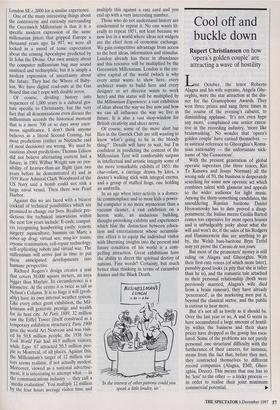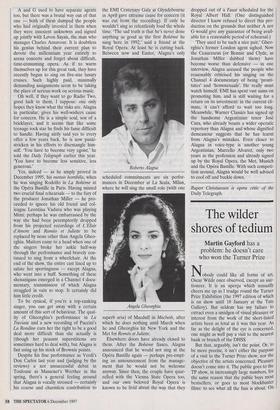Cool off and buckle down
Rupert Christiansen on how `opera's golden couple' are attracting a wave of hostility Last October, the tenor Roberto Alagna and his wife soprano, Angela Ghe- orghiu, were the star attraction at the din- ner for the Gramophone Awards. They won three prizes and sang three times in the course of the evening's cabaret, to diminishing applause. 'It's not even hype any more,' complained one senior execu- tive in the recording industry, 'more like brainwashing.' No wonder that 'opera's golden couple' have earned themselves in satirical reference to Gheorghiu's Roma- nian nationality — the unfortunate nick- name of 'the Ceaucescus'.
With the present generation of global operatic superstars (the three tenors, Kiri Te Kanawa and Jessye Norman) all the wrong side of 50, the business is desperately searching for some new operatic act which combines talent with glamour and appeals to the wider audience for light music. Among the thirty-something candidates, the smouldering Russian baritone Dmitri Hvorostovsky has to date proved a disap- pointment; the Italian mezzo Cecilia Bartoli comes too expensive for most opera houses and is unbudgeably picky about what she will and won't do; if the sales of his Rodgers and Hammerstein disc are anything to go by, the Welsh bass-baritone Bryn Terfel may yet prove the Caruso de nos fours.
But most of the promoters' money is still riding on Alagna and Gheorghiu. With their first-rate voices (of which more later), passably good looks (a pity that she is taller than he is), and the romantic tale attached to their personal relationship (both were previously married, Alagna's wife died from a brain tumour), they have already `penetrated', as the marketing men put it, beyond the classical sector, and the public is curious to hear more.
But it's not all as lovely as it should be. Over the last year or so, A and G seem to have accumulated a large amount of hostil- ity within the business and their share prices have dropped as the gossip has esca- lated. Some of the problems are not purely personal: one structural difficulty with the furtherance of their careers, for instance, stems from the fact that, before they met, they contracted themselves to different record companies (Alagna, EMI; Gheo- rghiu, Decca). This means that one has to be 'lent' to the other — a tricky process in order to realise their joint maximum commercial potential. ■ A and G used to have separate agents too, but there was a brutal way out of that one — both of them dumped the people who had originally invested in them when they were innocent unknowns and signed up jointly with Levan Sayan, the man who manages Charles Aznavour. It is doubtless his genius behind their current plan to devote the millennium year entirely to arena concerts and forget about difficult, time-consuming opera. As if to warm themselves up for this great task, they have recently begun to sing on five-star luxury cruises. Such highly paid, minimally demanding assignments seem to be taking the place of serious work on serious music.
Oh well, if they want to go Radio Two, good luck to them, I suppose: one only hopes they know what the risks are. Alagna in particular, gives his well-wishers cause for concern. He is a simple soul, son of a bricklayer, and it seems that like some teenage rock star he finds his fame difficult to handle. Having airily said yes to every offer a few years back, he is now panic- stricken in his efforts to disentangle him- self. 'You have to become very egoist,' he told the Daily Telegraph earlier this year. `You have to become less sensitive, less generous.'
Yes, indeed — as he amply proved in December 1995, his mensis horribilis, when he was singing Rodolfo in La Boheme at the Opera Bastille in Paris. Having missed two crucial final rehearsals — to the fury of the producer Jonathan Miller — he pro- ceeded to ignore his old friend and col- league Leontina Vaduva who was playing Mimi: perhaps he was embarrassed by the way she had been peremptorily dropped from his projected recordings of L'Elisir d'Amore and Romeo et Juliette to be replaced by none other than Angela Gheo- rghiu. Matters came to a head when one of the singers broke her ankle half-way through the performance and bravely con- tinued to sing from a wheelchair. At the end of the show, the entire cast lined up to salute her sportingness — except Alagna, who went into a huff. Something of these shenanigans emerged in a Channel 4 docu- mentary, transmission of which Alagna struggled in vain to stop. It certainly did him little credit.
To be cynical, if you're a top-ranking singer, you can get away with a certain amount of this sort of behaviour. The qual- ity of Gheorghiu's performance in La Traviata and a new recording of Puccini's La Rondine earn her the right to be a good deal more difficult than she actually is (though her peasant superstitions are sometimes hard to deal with), but Alagna is fast using up his stock of Brownie points.
Despite his fine performance as Verdi's Don Carlos last year and (judging by the reviews) a not unsuccessful debut in Toulouse as Massenet's Werther in the spring, there's a general feeling around that Alagna is vocally stressed — certainly his coarse and charmless contribution to the EMI Centenary Gala at Glyndebourne in April gave extreme cause for concern (it was cut from the recording). If only he wouldn't sing so relentlessly loud the whole time. 'The sad truth is that he's never done anything as good as the first Boheme he sung here in 1992,' said a friend at the Royal Opera. At least he is cutting back. Between now and Easter, Alagna's only Roberto Alagna scheduled commitments are six perfor- mances in December at La Scala, Milan, where he will sing the small role (with one Angela Gheorghiu superb aria) of Macduff in Macbeth, after which he does nothing until March when he and Gheorghiu hit New York and the Met for Romeo et Juliette.
Elsewhere doors have already closed to them. After the Boheme fiasco, Alagna announced that he would not sing at the Opera Bastille again — perhaps pre-empt- ing an announcement from the manage- ment that he would not be welcome anyway. Since then, the couple have quar- relled with the Vienna State Opera too, and our own beloved Royal Opera is known to be livid about the way that they dropped out of a Faust scheduled for the Royal Albert Hall. (One distinguished director I know refused to direct this pro- duction on the grounds that neither A nor G would give any guarantee of being avail- able for a reasonable period of rehearsal.) `They used to be such a nice pair,' Gheo- rghiu's former London agent sighed. Now the Ceaucescus (or Bonnie and Clyde, as Jonathan Miller dubbed them) have become worse than defensive — in one interview, Alagna accused the people who reasonably criticised his singing on the Channel 4 documentary of being 'prosti- tutes' and 'homosexuals'. He really must watch himself. EMI has spent vast sums on promoting him, and is still waiting for a return on its investment: in the current cli- mate, it can't afford to wait too long. Meanwhile, Warner Classics has signed up the handsome Argentinian tenor Jose Cura, who already boasts a wider operatic repertory than Alagna and whose dignified demeanour suggests that he has learnt from Alagna's mistakes. Even closer to Alagna in voice-type is another young Argentinian, Marcello Alvarez, only two years in the profession and already signed up by the Royal Opera, the Met, Munich and the Opera Bastille. With such competi- tion around, Alagna would be well advised to cool off and buckle down.
Rupert Christiansen is opera critic of the Daily Telegraph.



















































































 Previous page
Previous page